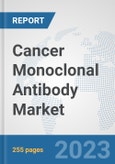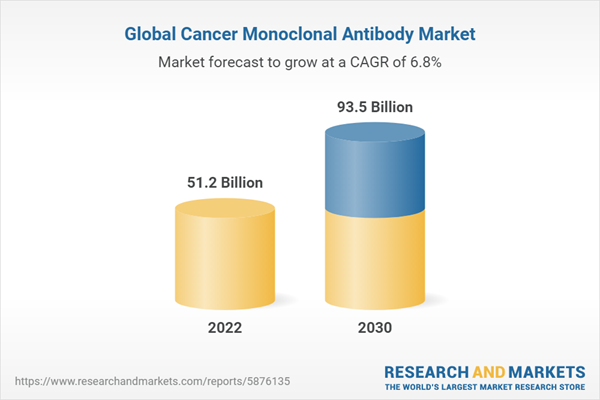Monoclonal Antibody (mAb) are artificially engineered molecules that mimic the immune system's ability to combat infections by precisely targeting particular pathogens. The process involves extracting B cells from a host exposed to a specific antigen, and fusing these cells with cancer cells to generate hybridomas responsible for producing the desired antibodies. These hybridomas undergo screening, cloning, and large-scale cultivation to produce abundant monoclonal antibodies, subsequently refined through purification for diverse applications. The field continues to evolve, with ongoing innovations enhancing their effectiveness and broadening their scope across medical treatment and scientific investigations. Additionally, an increase in cancer cases is anticipated to drive the monoclonal antibody market. Also, improper work-life balance, unhealthy lifestyle, uncontrolled drug consumption, chemical exposure, and food habits including heavy fat diet and saturated food consumption lead to cancer, thereby it expands the monoclonal antibody market.
Among the above segments, breast cancer is anticipated to dominate the cancer monoclonal antibody market. For instance, according to a report shared by (World Cancer Research Fund International) Breast Cancer was the most common cancer in women worldwide contributing 25.4 % of the total number of new cases diagnosed worldwide. Due to advancements in healthcare technology life expectancy is increased, and obesity, drinking habits, and smoking habits due to improper work-life balance are factors that lead to the risk of breast cancer. Also, the risk of breast cancer rises after 55 years of age, radiological exposure, and hormone replacement therapy are responsible for breast cancer, these are factors that make breast cancer more prevalent and thereby create the demand for cancer treatment, which ultimately drives the cancer monoclonal antibody market.
The cancer monoclonal antibodies are segmented into Asia Pacific, North America, Europe, the Middle East & Africa, and South America. North America is predicted to dominate the cancer monoclonal antibodies market over the forecast period. Across North America, multiple well-developed and various industries, such as agriculture, construction, chemicals, medicines, and food processing, are present. According to estimates from American Health Ranking 2021, there are more than 55.8 million adults in the U.S., who are 65 or older, making up over 16.8% of the total population. In North America advancement in healthcare technologies is responsible for the rising geriatric population, which leads to an increase in diseases such as cancer, which is driving the cancer monoclonal antibody market. In 2023, the United States announced an increase of 12.7% in investment in research and development. In comparison to 2022, is anticipated to further research on the cancer monoclonal antibody market. Food habits in North American countries include heavy fat, saturated fat-containing products such as hot dogs, salami, lunch meats, jerky, bacon, and other cured meat items that will lead to cancer. This creates a high demand for cancer treatment, which will further drive the cancer monoclonal antibody market. As a result, the above-mentioned factors, rising cancer cases, and investment in R&D will continue to expand the market.
Report Findings
1) Drivers
- The market experiences growth propelled by the rising incidence of cancer.
- The growth of the market is boosted by the development of diversified treatments.
2) Restraints
- High costs associated with the treatment methods hamper the growth of the market.
3) Opportunities
- The market presents lucrative growth opportunities due to the rapid increase in healthcare awareness.
Research Methodology
A) Primary Research
The primary research involves extensive interviews and analysis of the opinions provided by the primary respondents. The primary research starts with identifying and approaching the primary respondents.The primary respondents are approached include
1. Key Opinion Leaders2. Internal and External subject matter experts
3. Professionals and participants from the industry
The primary research respondents typically include
1. Executives working with leading companies in the market under review2. Product/brand/marketing managers
3. CXO level executives
4. Regional/zonal/country managers
5. Vice President level executives.
B) Secondary Research
Secondary research involves extensive exploring through the secondary sources of information available in both the public domain and paid sources. Each research study is based on over 500 hours of secondary research accompanied by primary research. The information obtained through the secondary sources is validated through the crosscheck on various data sources.The secondary sources of the data typically include
1. Company reports and publications2. Government/institutional publications
3. Trade and associations journals
4. Databases such as WTO, OECD, World Bank, and among others.
5. Websites and publications by research agencies
Segment Covered
The global cancer monoclonal antibody market is segmented on the basis of antibody type, application, and end user.The Global Cancer Monoclonal Antibody Market by Antibody Type
- Murine
- Chimeric
- Humanized
The Global Cancer Monoclonal Antibody Market by Application
- Blood Cancer
- Breast Cancer
- Lung Cancer
- Others
The Global Cancer Monoclonal Antibody Market by End User
- Hospitals and Clinics
- Research and Academic Institute/Laboratories
Company Profiles
The companies covered in the report include- Genentech, Inc.
- Dr. Reddy’s Laboratories Ltd.
- Eli Lilly and Company
- Novartis AG
- Par Pharmaceutical
- CELGENE CORPORATION
- Merck & Co., Inc.
- Bristol-Myers Squibb Company
- Roche Holding AG
- AstraZeneca
What does this Report Deliver?
1. Comprehensive analysis of the global as well as regional markets of the cancer monoclonal antibody market.2. Complete coverage of all the segments in the cancer monoclonal antibody market to analyze the trends, developments in the global market and forecast of market size up to 2030.
3. Comprehensive analysis of the companies operating in the global cancer monoclonal antibody market. The company profile includes analysis of product portfolio, revenue, SWOT analysis and latest developments of the company.
4. Growth Matrix presents an analysis of the product segments and geographies that market players should focus to invest, consolidate, expand and/or diversify.
Table of Contents
Companies Mentioned
- Genentech, Inc.
- Dr. Reddy’s Laboratories Ltd.
- Eli Lilly and Company
- Novartis AG
- Par Pharmaceutical
- CELGENE CORPORATION
- Merck & Co., Inc.
- Bristol-Myers Squibb Company
- Roche Holding AG
- AstraZeneca
Table Information
| Report Attribute | Details |
|---|---|
| No. of Pages | 255 |
| Published | August 2023 |
| Forecast Period | 2022 - 2030 |
| Estimated Market Value in 2022 | 51.2 Billion |
| Forecasted Market Value by 2030 | 93.5 Billion |
| Compound Annual Growth Rate | 6.8% |
| Regions Covered | Global |
| No. of Companies Mentioned | 10 |









